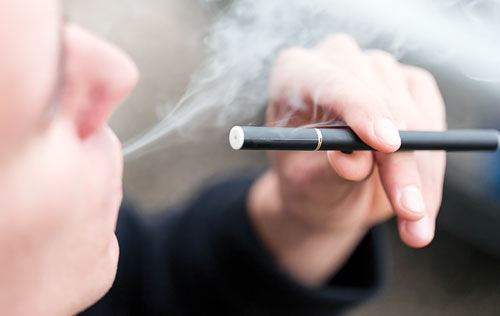The Food and Drug Administration (FDA) has authorized the first menthol-flavored e-cigarettes, sparking concerns of increased youth tobacco use and worsening health inequities for minoritized individuals and people with mental illness.
The FDA wrote in June that its action does not mean NJOY LLC’s four new mentholated e-cigarettes are FDA-approved, but rather they are permitted for sale in the United States. The agency authorized the products after a study by NJOY, a subsidiary of Altria Group Inc. (formerly Phillip Morris), reported that adult smokers were more likely to completely switch from combustible cigarettes to e-cigarettes (or quit smoking/vaping entirely) when using its menthol versus its unflavored e-cigarettes.
A Surprising Decision
Addiction and public health experts are not pleased with the FDA’s decision. “I’m very concerned that the public health evidence is ignored by the authorization of the sale of these mentholated e-cigarettes,” Douglas Ziedonis, M.D., M.P.H., executive vice president for health sciences and CEO of the University of New Mexico Health System, told Psychiatric News.
Numerous studies have shown that menthol increases tobacco’s appeal and facilitates the initiation and progression of smoking. “Users of menthol cigarettes smoke more, effectively developing stronger addiction to smoking,” said Smita Das, M.D., Ph.D., M.P.H., immediate past chair of APA’s Council on Addiction Psychiatry. “We know that they are less likely to be able to quit. It is presumable that the same will occur with menthol e-cigarettes.”
What makes this decision even more surprising, Ziedonis said, is that the FDA had been in the process of prohibiting menthol in cigarettes and all flavorings in cigars. “This contradiction in their own public health approaches will likely impact youth and emerging adults to increase their health risks.”
Ziedonis said he is not aware of evidence showing that adults who use cigarettes—70% of whom say they want to quit—aren’t using currently available non-mentholated e-cigarettes to do so. “There seem to be plenty of adults adjusting without the menthol,” he said.
“Adding new tobacco products that have modes of being more addictive is dangerous,” said Das, a clinical associate professor of psychiatry and behavioral sciences at Stanford School of Medicine. “We have evidence-based ways of treating tobacco use disorder that are highly underutilized. They should be used before unproven products are recommended.”
The FDA’s move came just two months after the Biden administration
put on hold a proposed rule to ban menthol in combustible cigarettes after facing political pressure from police and civil rights groups as well as intense industry lobbying. In response, the African American Tobacco Control Leadership Council, along with the American Medical Association and other groups,
refiled a lawsuit to compel the federal government to issue the menthol cigarette ban in a reasonable timeframe.
The lawsuit asserts that the federal government was directed by Congress to ban menthol cigarettes in 2009, has known since 2011 that doing so would protect the public health, and has engaged in a series of “half measures, doublespeak, and foot dragging.” Other countries that have banned menthol cigarettes include Canada, the European Union, and Turkey. In the United States, California and Massachusetts have enacted such bans, with similar legislation pending in a handful of other states.
Worsening Health Inequities
The tobacco industry has used menthol in some products for more than 100 years to mask the unpleasant flavor and harshness of tobacco while falsely marketing menthol cigarettes as less harmful. Although the number of people who smoke has declined in recent decades, the proportion of smokers who use menthol cigarettes has increased, with younger people, racial/ethnic minoritized groups, and individuals with mental illness more likely to smoke mentholated cigarettes, according to the Centers for Disease Control and Prevention.
In fact, due to decades of targeted marketing by the tobacco industry, more than 85% of Black Americans who smoke use menthol cigarettes, compared with 35% of White smokers, according to the FDA. Das said that by targeting certain groups with an even more addictive version of their product, the tobacco industry is contributing to health inequities.
Youth Initiation Risk
There was a significant decrease in tobacco use by high schoolers in 2023, largely driven by a drop in current e-cigarette use (14%, compared with 10% in 2022), according to the 2023 National Youth Tobacco Survey (NYTS). This translates to 580,000 fewer high schoolers using e-cigarettes.
Yet flavoring of all types, including menthol, appears to play a key role in hooking kids on tobacco, with nearly nine out of 10 youth who use e-cigarettes vaping flavored products, according to NYTS. Fruit flavorings were the most popular, but mint and menthol flavors were also commonly used. In fact, more than half of students who use e-cigarettes (58%) reported using flavors with “ice” or “iced” in the name.
Will the newly authorized menthol e-cigarettes cause a surge in youth tobacco use? According to the American Lung Association (ALA), two of them contain higher levels of nicotine than an entire pack of cigarettes. “The tobacco industry has been using menthol and other flavors to attract kids for decades—this opens up a legal pathway for NJOY to market their highly addictive products,” ALA President and CEO Harold Wimmer said in a statement calling for the removal of all flavored tobacco products from the market.
“Ultimately, the benefits of authorizing menthol e-cigarettes do not outweigh the risks,” Das said. “The more we can achieve a direction toward a tobacco-free future, the better for public health. Flavorings in tobacco products are a barrier to that vision.” ■



